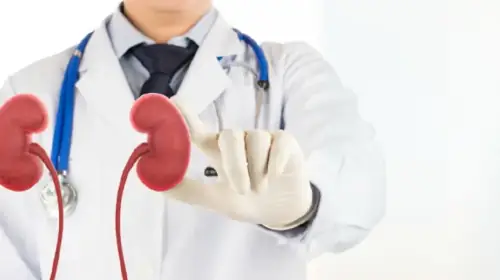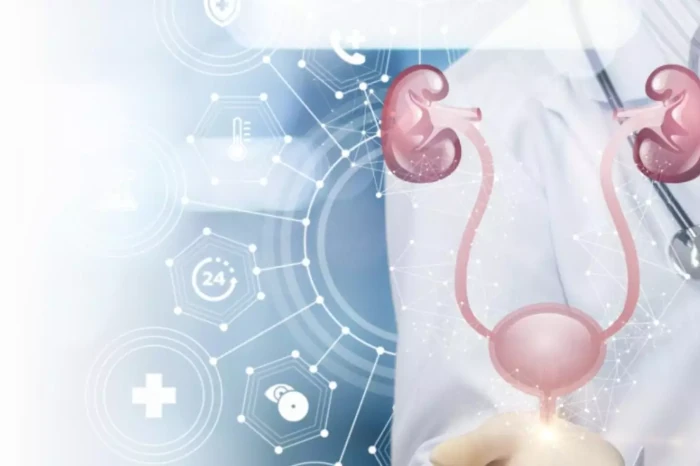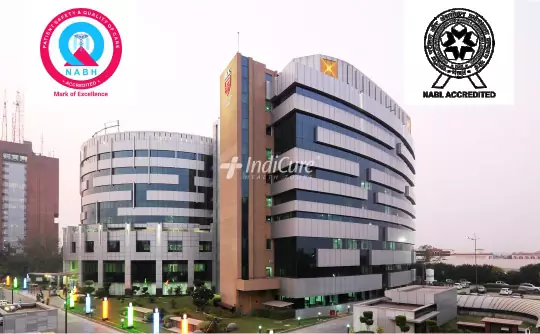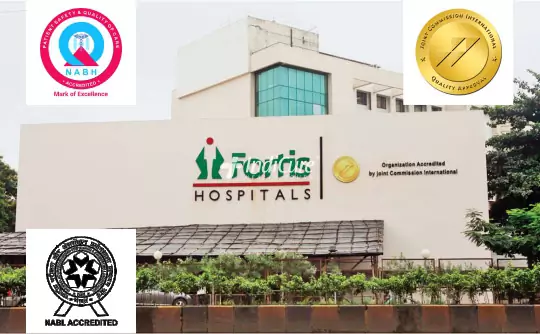

Robotic Prostate Surgery Cost in India starts from US $6,500 and varies depending on your medical condition and comorbidities, if any, surgeon, facility and the city where you choose to get the surgery done.
An important expense when it comes to your robotic prostate surgery cost in India is going to be your surgeon's fees. IndiCure recommends highly experienced, skilled, board-certified surgeons who are capable of delivering great results. Although the charges may vary depending on the experience of the surgeon, you can be assured that you are in safe and skilled hands when you choose medical treatment in India with IndiCure.
Having your robotic prostate surgery in an accredited surgical facility by skilled and qualified medical staff is a critical factor. Moreover, the geographical location of this facility also affects the quote. But, IndiCure provides you with a projected estimate that will be all inclusive and affordable.
The surgery-related expenses include the pre- and post-surgical expenses. The pre-surgical expenses are associated with the candidacy and the medical history of the patient. This also includes the routine medical exams and tests to ensure you're a good fit for the surgery. Post-surgical expenses may include prescription medications and follow-up consultations.
We at IndiCure, understand that you travel with a budget in mind and do not like to be greeted by surprises after arrival in India. We thus club all these expenses and give you the package cost that is inclusive and affordable at the same time.
Your case manager shall give you an estimated cost of your surgery after discussing your medical reports with the surgeon. The final cost, however, shall be confirmed after your consultation with the surgeon.
In fact, we have Special Negotiated Rates with the Hospitals and you can avail Discounted Rates when you choose to Travel with IndiCure.


We Help you Choose the Right Treatment, Surgeon & Hospital

We Arrange Video/Telephonic Consultation with the Surgeon

We Assist you with Visa & Accommodation

We Receive you at the Airport and Drop you at Hotel/Hospital

We Assist you the at Hospital & Provide Post Operative Support

New Delhi
BL Kapur Memorial Hospital is one of the biggest standalone private hospitals in Delhi, NCR. Established by late Dr. B L Kapur, an eminent Obstetrician, and Gynecologist on invitation by then Prime Minister of India, Mr. Jawahar Lal Nehru. The institute went on to become one of Delhi's premier multi-specialty hospitals.

Mumbai
Fortis Hospital, Mulund is a 300 bedded multispeciality tertiary care facility situated in the centre of the city, offering a range of clinical, diagnostic, and surgical services. The hospital began operations in 2002 and since then has achieved various milestones.
Robotic radical prostatectomy surgery is a cutting-edge approach to prostate surgery. This operation employs the use of a robot, which allows surgeons to work with far greater precision. In comparison to standard TURP surgery, it allows physicians to create the smallest incisions feasible in the patient's body.
Robotic surgery allows the surgeon to benefit from better visualization and precision. It allows for surgery through 1-2 cm incisions. This enables surgeons to make precise computer-assisted movements. This robot allows for a more precise and least invasive robotic prostatectomy.
What is a Da Vinci Robotic System, and how does it work?
The da Vinci robotic system is driven by cutting-edge robotic technology that allows it to execute a variety of surgeries with extreme precision. This method is most typically used for prostatectomy and hysterectomy, but it is now being employed for heart valve replacement and gynecological procedures.
Because of its safety and efficacy, the da Vinci robotic surgical system is now employed all over the world. This method allows the surgeon to do the procedure with precision and full control through a 1 to 2 cm precise incision. The da Vinci robotic system consists of the following components:
Patients with clinically localized prostate cancer are treated with robotic laparoscopic prostatectomy. The majority of patients who are good candidates for open radical prostatectomy are also good candidates for robotic prostatectomy. The robotic technique is the treatment of choice for the surgical management of clinically localized prostate cancer.
However, patients who have undergone major abdominal surgery, radiation, have pre-existing heart or lung problems, are morbidly obese, or have a history of bleeding tendencies may not be the ideal candidates for robotic prostatectomy.
Robotic prostatectomy is not recommended for patients who have known metastatic or recurrent prostate cancer. Although patients with big prostate glands (> 100 grammes) can have robotic prostatectomy, the procedure takes longer than in patients with smaller prostate glands.
The surgeon removes the prostate gland from the surrounding tissue. The seminal vesicles, two small fluid-filled sacs next to your prostate, are also removed.
The surgeon reattaches the urethra to a part of the bladder called the bladder neck. The urethra is the tube that carries urine from the bladder out through the penis.
Your surgeon may also remove lymph nodes in the pelvis to check them for cancer. A drain, called a Jackson-Pratt drain, may be left in your belly to drain extra fluid after surgery. A tube (catheter) is left in your urethra and bladder to drain urine. This will stay in place for a few days to a few weeks.
After laparoscopic or robotic surgery, most people stay in the hospital for 1 to 2 days. For at least one month after surgery, doctors advise against excessive exertion or heavy lifting. The majority of people take three to four weeks off work.
In comparison to a traditional prostatectomy, robot-assisted prostatectomy can result in less pain and blood loss, less tissue trauma, a shorter hospital stay, and a faster recovery time. Around four weeks after surgery, you should be able to resume routine activities with few restrictions.
Prostatectomy is a simple procedure that provides long-term relief from urinary symptoms caused by an enlarged prostate. Although it is the most invasive surgery for treating an enlarged prostate, it has a low risk of serious complications. The majority of men who get the operation don't require any additional BPH therapy.
We at IndiCure completely understand your concerns and it is always our endeavor to provide the best outcome for every patient. Following is the list of questions you must ask before you embark on your journey for Robotic Prostate Surgery in India.
Prepare to answer questions about your:

One of the most effective techniques for the treatment of prostate cancer is robotic radical prostatectomy. It has a high success rate and is carried out in the safest and most effective manner possible. In India, surgery success rates range from 90 to 98 percent.
The cost of a robotic radical prostatectomy operation starts at $6500 in India.
Depending on the size, architecture, and constitution of the prostate, as well as the length of operation required, the robotic prostatectomy often takes 2 to 4 hours or more.
After robotic prostatectomy surgery, most patients are able to return home the next day or in two days.
Patients can usually return to their normal activities 14 to 21 days after surgery. Heavy lifting and intense activity should be avoided for the first four weeks after surgery. The majority of robotic prostatectomy patients are able to return to work within 3-4 weeks of the procedure.
Patients who have been told they need surgery for prostate cancer are usually good candidates for robotic prostatectomy. Open prostatectomy is a minimally invasive surgery that usually produces great results for those who are suitable.
A urinary catheter is required to ensure proper urine drainage from the bladder and to aid in the healing of the operated area. It is frequently necessary for a week or two following surgery.
The da Vinci Surgical System is currently in use in hundreds of places throughout the world, including major institutions in India, Malaysia, Thailand, and the United Arab Emirates.
The following are some of the primary advantages that surgeons who use the da Vinci Surgical System have over traditional approaches:
Approximately 1.5 million procedures including general, urologic, gynecologic, thoracoscopic, and thoracoscopically-assisted cardiotomy procedures have been performed using the da Vinci Surgical System.
Do not eat or drink anything for at least 8 hours before the surgery. To clean the bowels, you may be advised to take laxatives or an enema before the treatment. Some medications should be avoided for ten days before surgery. Aspirin, warfarin, vitamins, and anti-inflammatory medications are among them.
The high-tech equipment used to perform the surgery is one of the key benefits of robotic prostatectomy.
First, the employment of a specialized stereoscopic endoscope lens attached to a high definition camera improves visualization with 10-12 X magnification and a high resolution image of the inside anatomy.
Second, robotic surgeons use multi-jointed 8 mm devices with dexterity comparable to a human wrist. When combined, robotic surgery improves visualization of the critical structures surrounding the prostate gland and allows surgeons to operate with the same flexibility and ease as an open surgeon when performing an open prostatectomy, all while using smaller incisions and resulting in significantly less blood loss.
If trouble with dissection or severe bleeding is found with the robotic method, conversion to open surgery may be required. Our surgeons are trained in both open and laparoscopic surgery, as well as robotic surgery, and are thus well equipped to complete the procedure in either a laparoscopic or open manner as necessary.
Prognosis remains excellent for individuals with organ-confined prostate cancer that has not progressed beyond the prostate capsule, lymph nodes, or seminal vesicles, as most are treated with surgery alone. Additional treatments, including radiation and hormone therapy, may be required if more invasive or metastatic illness is discovered.
The timing and extent of urine continence and sexual potency after prostatectomy is a complex, time-dependent, and multifaceted process. Patient characteristics such as age, preoperative urine and sexual function, and the existence of medical disorders such as hypertension and diabetes are some of the factors that determine the success of the return of these quality of life concerns. Surgical parameters such as the quality and quantity of nerve preservation can also have an impact on the result.
Research shows that at 6 and 12 months, respectively, 80 percent and 93 percent of young patients (60 years old) who were preoperatively potent with no urinary issues and received bilateral nerve preservation were continent (defined as 0-1 security pad) and 72 percent and 85 percent were potent (defined as having the ability to engage in intercourse with or without the use of phosphodiesterase inhibitor medications). Individual factors, such as the amount of cancer, age, and concomitant medical disorders, can have a substantial impact on these outcomes.
Enhance your medical journey to India by availing these extra services.
Traveling abroad for medical reasons may be challenging. With our experience of over a decade and working with the best surgeons and top hospitals in India, we help make your medical tour easier and safer for you. We will guide you at every step of the way and make end-to-end arrangements for your surgery, travel, and stay.
Ramandeep Dhaliwal
I had great experience having rhinoplasty through Indicure. Dr. Ruchika from Indicure has helped me in finding best plastic surgeon, answering all my questions...
Read More
Joshua Archer
My name is Joshua Archer I'm from New Zealand, bay of plenty, kawerau I opted for the bypass surgery in January 2023 but planned it in advance for 28 September found IndiCure...
Read More
Kera Ren
Absolutely loved my experience with IndiCure - from first inquiring to meeting the surgeon pre op to my follow up post op. The surgeon was extremely approachable...
Read More
Andreana Paul
Had a wonderful experience. Visited India for my plastic surgery. From sending mails, airport pickup, comfortable accommodation and, to smooth hospital appointment booking...
Read More
Brandi Luce
I had the privilege of using Indicure's services for a cosmetic procedure that I had wanted for a long time but had always been apprehensive about. Ruchika helped me...
Read More
Jade M
Indicure Health Tours went above and beyond my expectations. They helped me with every aspect of my journey and were professional, kind and caring. I was...
Read More
The content on the website (www.indicure.com) is intended to be general information and is provided only as a service. All photographs on our website of before and after results are examples only, and do not constitute an implied or any other kind of certainty for the result of surgery.
Learn about IndiCure Health Tours' comprehensive editorial policy that strives to deliver trustworthy, helpful, relevant, accurate and people-first content on medical tourism in India.
It is not medical advice and should not be taken as medical advice. It should not be used to diagnose or treat a health condition and is in no way meant to be a substitute for professional medical care. You are advised to see a surgeon in person to assess what surgery may or may not accomplish for you.
It is also important to keep your expectations realistic and to understand that all surgical procedures carry risks and should never be taken lightly.